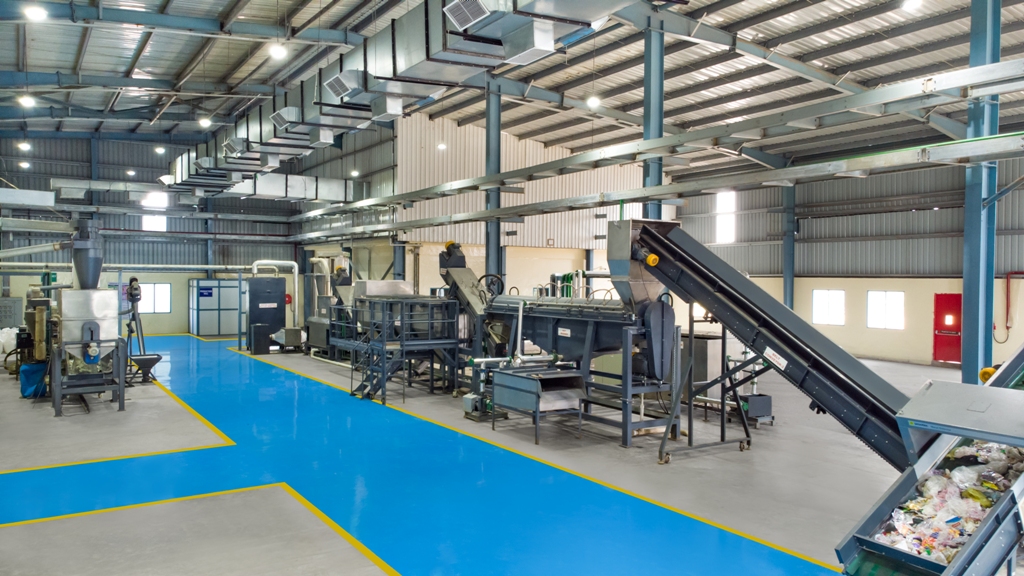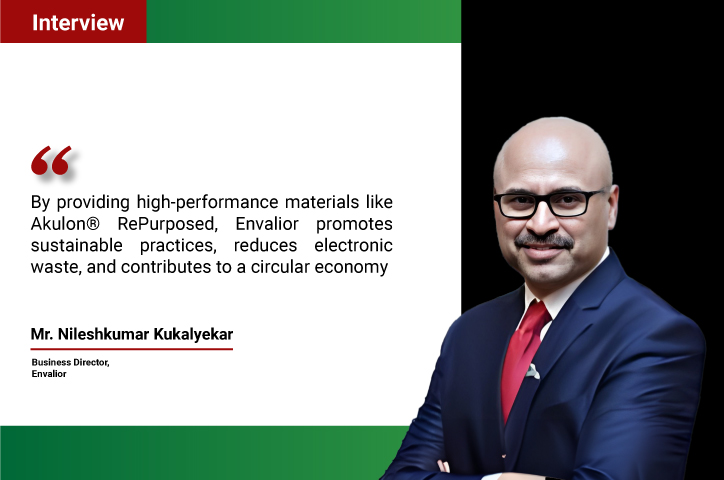Huhtamaki India, part of the Finnish-based global food packaging major, Huhtamaki Oyj, is a prominent player in primary consumer packaging and decorative labelling solutions. Committed to sustainability, the company aims to achieve carbon-neutral production and ensure all products are recyclable, compostable, or reusable by 2030. Their blueloop™ sustainable packaging solutions lead the industry in circularity, driven by collaborations with stakeholders to promote sustainability at a macro level.
In this exclusive interview with TheCSRUniverse, Mr. Rahul Nene, Head of Sustainability, Huhtamaki India, takes us on a journey through the company's unwavering commitment to sustainability. He shares their visionary 2030 pledge and highlights their impactful partnership with the NGO SWaCH, empowering waste collectors and promoting plastic circularity. Beyond production goals, the company's CSR initiatives prioritize community development, nurturing the growth of vulnerable communities.
He further delves into Huhtamaki Foundation's pioneering Khopoli Recycling Plant and the #CloseTheLoop initiative, revolutionizing multi-layered plastic waste recycling. Most importantly, Mr. Nene stresses regulatory backing for circular economy in packaging and industry's partnership with policymakers for a circular-friendly environment.
Join us as we gain insights into Huhtamaki India's holistic approach towards sustainability and their transformative efforts in shaping a greener, more sustainable future for the packaging industry and beyond.
Q&A
Q. Could you please shed light on Huhtamaki India's commitment to sustainability and its 2030 pledge to achieve carbon-neutral production and ensure all products are recyclable, compostable, or reusable?
A. Climate action is one of the paramount imperatives for any business today. At Huhtamaki, we have also aligned with UN SDG 13 and taken up targets and ambitions towards mitigating climate impact. We are committed to achieving carbon neutral production on scope 1 and 2 emissions by the year 2030 which means that all emissions coming out of fuel consumption on site as well as those associated with our usage of third party supplied energy will be eliminated or compensated elsewhere in order to reach carbon neutrality. Specifically in India, since each state has different regulations on renewable electricity along with different contexts in availability of renewable fuels, our strategy to achieve this ambition varies from state to state. Globally, our company targets are also ratified by the Science Based Targets initiative (SBTI).
 On the product side, when it comes to plastic packaging, the single most important focus area for us is to make our products recyclable and to drive increased circularity. Our blueloop™ brand represents Huhtamaki’s enterprise-wide range of sustainable packaging solutions. It is a central part of delivering on our 2030 strategy to become the first choice in sustainable packaging solutions. Under this program, we are working to develop mono-material packaging solutions for flexible packaging applications. We do this without compromising on the functionality of the packaging while maximizing recyclability of the solutions. With India facing issues of plastic waste arising out of a linear packaging value chain currently existing in the country, these recyclable solutions will help develop circularity for plastic packaging in the country.
On the product side, when it comes to plastic packaging, the single most important focus area for us is to make our products recyclable and to drive increased circularity. Our blueloop™ brand represents Huhtamaki’s enterprise-wide range of sustainable packaging solutions. It is a central part of delivering on our 2030 strategy to become the first choice in sustainable packaging solutions. Under this program, we are working to develop mono-material packaging solutions for flexible packaging applications. We do this without compromising on the functionality of the packaging while maximizing recyclability of the solutions. With India facing issues of plastic waste arising out of a linear packaging value chain currently existing in the country, these recyclable solutions will help develop circularity for plastic packaging in the country.
Q. Could you elaborate on the partnership between Huhtamaki India and the NGO SWaCH? How does this partnership empower waste collectors and contribute to the circularity of plastic?
A. SWaCH is a well-established NGO in waste management, employing efficient systems for collection and segregation. They employ waste pickers on-ground, simultaneously helping them improve their standards of living as well. Our partnership with SWaCH focuses on integrating waste collectors, often referred to as waste pickers or ragpickers, into the formal waste management system. In addition to collecting post-consumer waste and recycling it, we drive circularity across the value chain and create jobs. In our efforts to make a positive impact on the environment and local communities, this collaboration plays a significant role.
Recognizing the lack of multi-layered plastic (MLP) waste recycling units in India, Huhtamaki Foundation, a separate non-profit organization, established a sophisticated and advanced MLP recycling plant in Khopoli, India, last year, as MLP waste recycling does not get a high commercial value when compared to recycling of mono polymer packaging waste. Hence, this recycling plant has been set up with the objective to recycle such MLP waste, which otherwise tends to go to landfills and incineration. Bringing the synergies of the two organizations together, Huhtamaki Foundation is working with SWaCH to collect, segregate, and source post-consumer use MLP waste.
Q. Apart from the partnership with SWaCH, how does Huhtamaki collaborate on training and raising awareness about the importance of waste segregation and plastic waste management?
A. We are currently under the process of accelerating our efforts towards raising awareness on the importance of waste segregation and plastic waste management, to herald a major change from the grass root level, for which we are evaluating partnerships with NGOs working in the same space as SWaCH.
Q. Community development is an integral part of Huhtamaki's sustainable strategy. Can you explain why it is important for the company to nurture the growth of vulnerable communities within the ecosystem? What are some of the holistic CSR initiatives undertaken by Huhtamaki in this regard?
A. At Huhtamaki India, we're committed to being responsible corporate citizens, making a positive impact on local communities. Our community involvement plan aligns with the UN Sustainable Development Goals and our 2030 sustainability strategy. We strongly believe that there is a growing necessity for corporates to actively support and uplift vulnerable communities to promote inclusive and sustainable growth.
Collaboration between the private and public sectors is essential to foster resilience in areas like climate, food, supply chains, technology, education, and healthcare, empowering vulnerable communities with equal opportunities.
Our key community-based initiatives undertaken in the past year:
• Educating and protecting underprivileged girls from trafficking in Bangalore in collaboration with Need Base India, an organization focused on protecting and empowering children
• Huhtamaki India set up a library in a higher secondary school in Dapada, Silvassa
• Provided RO water purifier to rural schools in the Raigad district to ensure access to clean drinking water for children in Taloja
• Undertook water and sanitisation projects in municipal schools in Sikkim and Guwahati
Additionally, on World Clean Up Day, our partnership with Khushiyaan Foundation helped clean up Mumbai's Dadar beach, collecting 35 kg of post-consumer waste per volunteer. Our employees spent time segregating plastic waste from the beach and learned about plastic recycling and the circular economy.
Q. Could you provide more information about Huhtamaki Foundation's Khopoli Recycling Plant and its #CloseTheLoop initiative? How does the plant recycle post-consumer multi-layered plastic waste, and what value-added products are produced as a result?
 A. More than 60% of the plastic packaging used in India is flexible, with multi-layer packaging accounting for a significant portion of this. Additionally, mechanical recycling technology is used in India's plastic recycling infrastructure, whereas chemical recycling, which is more suitable for MLP waste, is rarely available due to capital and process costs. Because MLP is made up of layers of different polymers as well as metalized or paper-based layers, mechanical recycling of these structures is extremely difficult. While it is not impossible, the granules produced are of poor quality due to the presence of multiple polymers as well as remnants of ink and metal. As a result, MLP waste recycled granules do not receive a fair commercial value to be a profitable venture, and MLP waste recycling infrastructure in India is minimal, resulting in the majority of MLP waste ending up in landfills, garbage dumps, or even being incinerated.
A. More than 60% of the plastic packaging used in India is flexible, with multi-layer packaging accounting for a significant portion of this. Additionally, mechanical recycling technology is used in India's plastic recycling infrastructure, whereas chemical recycling, which is more suitable for MLP waste, is rarely available due to capital and process costs. Because MLP is made up of layers of different polymers as well as metalized or paper-based layers, mechanical recycling of these structures is extremely difficult. While it is not impossible, the granules produced are of poor quality due to the presence of multiple polymers as well as remnants of ink and metal. As a result, MLP waste recycled granules do not receive a fair commercial value to be a profitable venture, and MLP waste recycling infrastructure in India is minimal, resulting in the majority of MLP waste ending up in landfills, garbage dumps, or even being incinerated.
Huhtamaki Foundation's recycling plant aims to address the gap. On-the-ground waste pickers collect the waste, which is then separated and delivered to the recycling unit. The waste is then washed, dried, and recycled in order to produce recycled granules. The granules are then used as raw material by manufacturers of household plastic goods such as crates, waste bins, non-food storage containers, and so on. Currently, the plant recycles 1,000 kg post-consumer flexible plastic per day.
Furthermore, going back to the discussion on our sustainable innovations, our mono-material flexible packaging solutions address this recyclability challenge by eliminating and minimizing the multi-material layers, supporting the efficiency and yield from existing recycling technologies.
Q. Based on your extensive experience in sustainability and involvement in various industry initiatives, such as the India Plastics Pact and Circular Economy working groups, what insights or best practices have you gained that can be applied to drive positive environmental impact and circular economy practices in the flexible packaging industry?
A. One realization that comes out from discussions around circular economy and as part of industry associations is that circularity and sustainability cannot be achieved in silos. All the stakeholders in the value chain of packaging need to work together. From developing recyclable structures to using them in place of non-recyclable ones, having effective collection and segregation of such packaging waste from consumers, adequate availability of recycling infrastructure and commercially viable logistics to transport this waste are some of the key milestones in the circular economy of flexible packaging. As can be seen, each of the actions are dependent on the actions of other stakeholders and if this entire eco system does not work together, circularity cannot succeed.
Q. Are there any regulatory or policy changes that you believe would further support the adoption of circular economy principles in the packaging industry? How can industry players collaborate with policymakers to create an enabling environment for circularity?
A. India has demonstrated a strong commitment to implementing regulations around plastic waste management, especially since the last couple of years. Extended Producers’ Responsibility (EPR), single-use plastic ban, marking and labelling requirements, data visibility in the plastics value chain, targets for recycled content are some of the key pillars that have come up through these regulations.
The one area where we feel that regulations can play a key role is by encouraging the development of recyclable structures for flexible packaging. While inclusion of recycled content is already being worked upon, it can only succeed if we have recyclable (mono-layered) structures. If this area also gets covered under the guidelines and regulations, it will add great value to the circularity of flexible packaging.
The industry can work with the policy makers and provide the technical expertise as well as data points needed to form such policies. Additionally, the industry can aid policymakers in testing and assessing the industrial feasibility of proposed regulations. A collaborative approach between authorities and industries will ensure the development of fruitful, feasible, and impactful regulations.




 On the product side, when it comes to plastic packaging, the single most important focus area for us is to make our products recyclable and to drive increased circularity. Our blueloop™ brand represents Huhtamaki’s enterprise-wide range of sustainable packaging solutions. It is a central part of delivering on our 2030 strategy to become the first choice in sustainable packaging solutions. Under this program, we are working to develop mono-material packaging solutions for flexible packaging applications. We do this without compromising on the functionality of the packaging while maximizing recyclability of the solutions. With India facing issues of plastic waste arising out of a linear packaging value chain currently existing in the country, these recyclable solutions will help develop circularity for plastic packaging in the country.
On the product side, when it comes to plastic packaging, the single most important focus area for us is to make our products recyclable and to drive increased circularity. Our blueloop™ brand represents Huhtamaki’s enterprise-wide range of sustainable packaging solutions. It is a central part of delivering on our 2030 strategy to become the first choice in sustainable packaging solutions. Under this program, we are working to develop mono-material packaging solutions for flexible packaging applications. We do this without compromising on the functionality of the packaging while maximizing recyclability of the solutions. With India facing issues of plastic waste arising out of a linear packaging value chain currently existing in the country, these recyclable solutions will help develop circularity for plastic packaging in the country. A. More than 60% of the plastic packaging used in India is flexible, with multi-layer packaging accounting for a significant portion of this. Additionally, mechanical recycling technology is used in India's plastic recycling infrastructure, whereas chemical recycling, which is more suitable for MLP waste, is rarely available due to capital and process costs. Because MLP is made up of layers of different polymers as well as metalized or paper-based layers, mechanical recycling of these structures is extremely difficult. While it is not impossible, the granules produced are of poor quality due to the presence of multiple polymers as well as remnants of ink and metal. As a result, MLP waste recycled granules do not receive a fair commercial value to be a profitable venture, and MLP waste recycling infrastructure in India is minimal, resulting in the majority of MLP waste ending up in landfills, garbage dumps, or even being incinerated.
A. More than 60% of the plastic packaging used in India is flexible, with multi-layer packaging accounting for a significant portion of this. Additionally, mechanical recycling technology is used in India's plastic recycling infrastructure, whereas chemical recycling, which is more suitable for MLP waste, is rarely available due to capital and process costs. Because MLP is made up of layers of different polymers as well as metalized or paper-based layers, mechanical recycling of these structures is extremely difficult. While it is not impossible, the granules produced are of poor quality due to the presence of multiple polymers as well as remnants of ink and metal. As a result, MLP waste recycled granules do not receive a fair commercial value to be a profitable venture, and MLP waste recycling infrastructure in India is minimal, resulting in the majority of MLP waste ending up in landfills, garbage dumps, or even being incinerated.







.jpg)



